The Hierophant
There were lots of things I liked about church — the singing, for one thing, and the pageantry (Catholicism is wild — you eat the literal body of Christ and wash it down with a sip of his literal blood).

“The Hierophant is teacher and seer, philosopher and poet. He sees validity in knowledge and asks for intimate understanding of both the outer world and the meditative subconscious. His is an orthodox approach — his study, formal. He symbolizes structure, institutions, and the core values of learning. He adheres to doctrine and encourages decisive action only after deep thought, rational debate, and discussion with trusted mentors. He points to the importance of passing down wisdom, demanding that all masters become mentors. He insists that all knowledge gained, must be shared. He represents sacred ritual, established religious dogma, and adherence to long-standing tradition. The Hierophant is sage, leader, and guru, providing clear and gentle guidance on the path to greater knowledge and deeper understanding.”
- The Library of Esoterica Tarot written and edited by Jessica Hundley
The first time I quit drinking was in 2016, a few months before Trump was elected President. These were the early days of medical marijuana in Los Angeles, and my husband had back pain or possibly glaucoma. Our daughter was eighteen months old, on a jagged bender of three days of no sleep due to congestion and insanely tiny nostrils. We finally got her down to sleep, and Zack took out two THC pills that were supposedly 5mg. We took them and settled in to watch Game of Thrones.
Half an hour into the incestuous dragon drama, I turned to Zack and said, “I think I’m feeling it.” As soon as Zack said, “Me too,” our daughter woke up with a fever. High and sleep deprived (also probably horny, remember how horny Game of Thrones made you in those early days?), Zack and I panicked. It was not even eight o’clock, and there was no way this child was going back to sleep without being sure she had both of us in her tiny grasp. We were in no shape to try to coax sleep out of her. We put her in the bed between us, and lay stiff as boards staring up at the ceiling getting progressively higher until we both lost our fucking minds. 5MG my ass.
Over the course of the night as our daughter slept, Zack and I wrestled with our demons. Zack describes the experience as traveling through his brain and getting to every door that he had closed for one reason or another and instead of moving past it, saying, fuck it, let’s open this bad boy and confront my darkest shit. I spent the night excavating my shame about being the mother with a sick child who was too high to do anything to help her in the event of an earthquake. The next morning, Zack and I decided to quit drinking, which we did for a full year.
At the beginning of that year of white knuckling, I went to AA twice. I googled “AA meeting” and went to the first one I could find, an eclectic group of young professionals, ex-felons, motorcycle dudes, and former gang members meeting in a windowless room in Glendale. The overwhelming feeling I had in that room was “I am an imposter.” I knew that drinking was something I couldn’t quite control, but I also felt like the people in that room had earned their place there and had the stories and battle scars to prove it. I, on the other hand, couldn’t say no to a third glass of wine, and had taken a THC pill to watch Game of Thrones and freaked out. I felt like the kid in college who ends up on the floor screaming she’s going to die after eating a pot brownie (which is exactly what happened to me when I ate a pot brownie in college). I was a buzzkill and a lush, a geek with no chill or willpower, but I wasn’t an alcoholic.
The truth is more complicated. I’m pathologically averse to groups. AA reminded me of church, and church was something I could not stomach. I was, as I liked to say in those days, “not a joiner.” I also didn’t enjoy activities or outings, because it was far more enjoyable to hang around my own house and drink. Again, I did not think I had a “real” problem with alcohol. I just wanted to do nothing more than I wanted to drink. Wasn’t that true of everyone? (Turns out, no, it wasn’t).
I’ve always had a sticky relationship with organized groups and orthodoxy. As a pre-teen, my parents made me attend CCD classes at our local church. In spite of my father’s clarity that God wasn’t something I needed to believe in, my parents’ devotion to my maternal grandmother and her faith was unshakeable. I was getting confirmed. It wasn’t a debate. I didn’t have to believe in any of it, but I was doing it for Grammy and that was final. My dad tried to soften the hypocrisy by arguing that it would be good for me to study the Bible because so much literature alludes to it. I was to think of my catechism as a sort of book club that would prepare me for future scholarship.
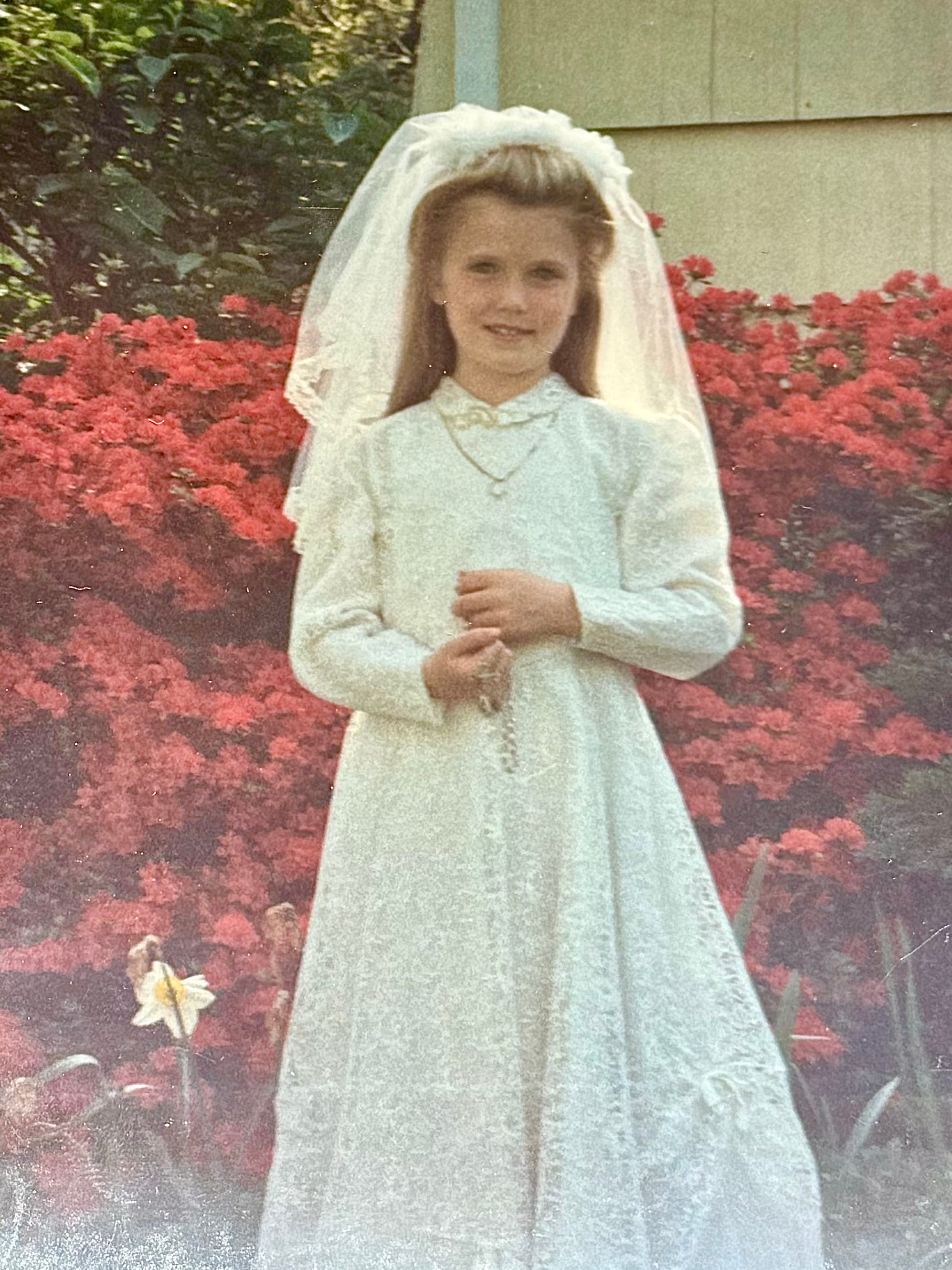
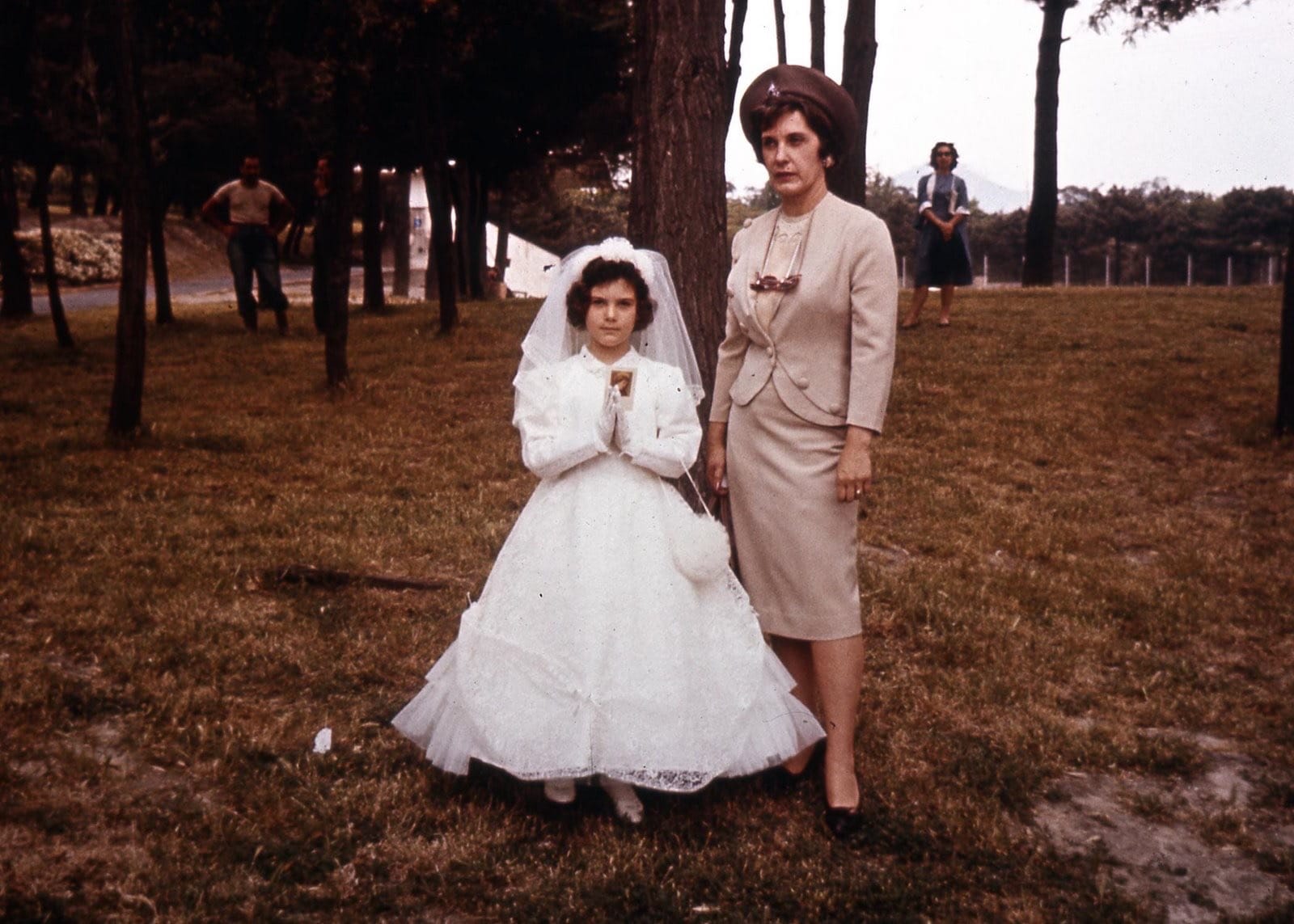
Luckily CCD was co-ed and there were cute boys in my class. And my dad wasn’t completely wrong about it being useful to learn about the stories from the Bible. The story of Abraham’s willingness to sacrifice Isaac, for example, did not end the way I expected it to. In my version of that story, God chastises Abraham for his willingness to kill his own child, saying something like, “Bitch, I am God, I would never want you to choose me over your own child, are you crazy?” Famously, that’s not the way that story ends. God is stoked that Abraham is devoted and obedient enough to Him to kill his child, and only at the last minute says, “Good, I’m glad you were about to kill your own kid, now here’s a sheep you can slaughter instead.” Isaac, who by the way, has been strapped to a rock so he won’t squirm while his dad plunges a knife into his throat, is just supposed to watch his dad murder a goat in his stead and then GO HOME WITH THE MAN! It freaked me out (as an oldest child) that we were all casually discussing what a devoted God-fearing man Abraham was without mentioning that he was also a sociopathic narcissist and an objectively terrible father. Also, God was kind of a sociopath too.
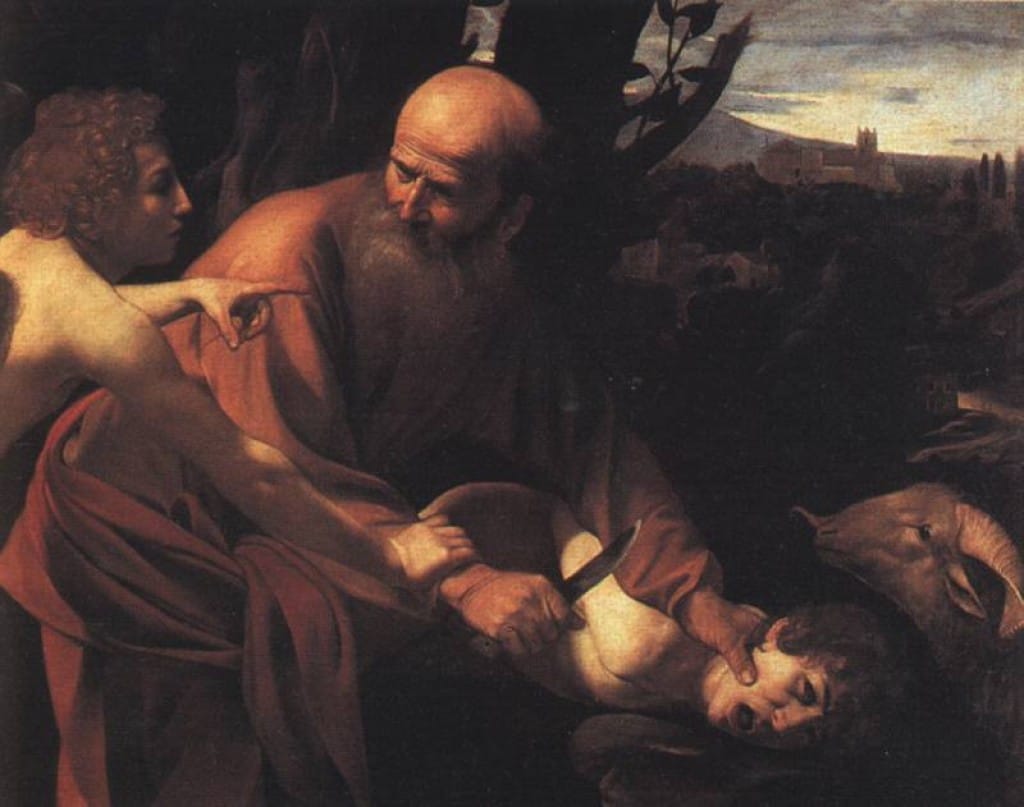
The classes culminated in our confirmation ceremony which essentially was a group of gawky ninth graders standing up before our congregation declaring our commitment to Catholicism. I remember the feeling I had as the priest asked us to declare a set of rigid commitments in front of our parents and our friends’ parents. The commitments included, “I vow not to use alcohol or drugs” and “I vow to stay abstinent until marriage.” I vowed like the rest of my lying peers, though I knew that half these kids were already giving handjobs and sneaking beers.
The whole thing felt depressing to me. There were lots of things I liked about church — the singing, for one thing, and the pageantry (Catholicism is wild — you eat the literal body of Christ and wash it down with a sip of his literal blood). I wouldn’t mind vowing to be generous, or to look after those who needed it, to be kind or caring. But it was too much for my 13 year old brain to wrap my head around the utility of a religion that would ask a bunch of kids to stand up and proudly lie to their parents that they wouldn’t have sex until they were married. I honestly don’t even think the parents thought their kids were telling the truth. I got the distinct feeling that somehow we were all doing this for our grandmothers.
So I swore in front of my parents and my friends’ parents that I wouldn’t try alcohol until I was grown, and in the months after my confirmation, I began sneaking around with my friends, drinking whatever we could get our hands on. Sometimes that was a Coors light, sometimes it was vodka ferreted down to the beach in a Poland Spring water bottle. My experience in CCD and at church was a confirmation, though not in my belief in God. Instead, it confirmed the belief I had long held: that the adult world was sort of full of shit, that lying was the only way to be compliant with rules that you were supposed to follow but no one actually did.
That same year, I started attending Young Life, which was a popular Christian teen group in my town. Everybody went, including all of the boys I wanted to have premarital sex with. I’m sure my father was mortified when I announced I wanted to start attending the weekly meetings. I was supposed to get confirmed, I wasn’t supposed to start believing it.
To be clear, I didn’t believe it. I just wanted to do what other kids were doing, which is further evidence that I’m full of shit when I say I’m not a joiner. Like almost every teenager, I always wanted to be an accepted member of a group, though in a protected area of my brain, I also held tight to the idea that this group (and any group) was stupid, and that my reasons for joining it had nothing to do with a desire to believe in anything, but rather, a fear of missing out.
One night at Young Life, a boy stood up to tell a story. I don’t remember a lot about these meetings, but there was a lot of testimonial sharing. This boy’s sister had died, and he spoke of how grateful he was that she was in a better place now (with Jesus in heaven) and that he couldn’t wait to see her again someday (again, with Jesus in heaven). That was one of the last Young Life meetings I attended. I couldn’t handle it, the certainty of this boy, his beliefs which I just couldn’t understand, but also my envy. I had already begun to spend a lot of time worrying about whether I was good or not, and my teen years were filled with existential dread. I was furious at this boy that he could go on living after his sister died, filled with faith in an afterlife that I couldn’t, though I desperately tried to, believe in.
The second time I quit drinking, I knew it had to be different. Part of what had led me to the dark place I had found myself was an inability to rely on other people, a desire to control everyone else’s feelings about me (impossible), a need to anesthetize, and a deep distrust of myself. Somehow I knew that there was no way I was going to actually quit drinking without venturing out of my comfort zone, and perhaps even (shudder) joining a group.
The Hierophant is a teacher and a spiritual guide. While the High Priestess asks us to trust ourselves, the Hierophant suggests you may need a second opinion. The Hierophant asks us to examine what rules, customs, and orthodoxies govern our lives. The card does not suggest that you blindly follow your teachers (don’t be an Abraham), but it also reminds you that you do not have all the answers, and it’s okay to ask for help.
I’ve written about this before, but the book I read that changed my relationship to alcohol was QUIT LIKE A WOMAN, by Holly Whitaker. Part of what worked for me about it was its criticism of groups like Alcoholics Anonymous. The book takes us back to the founding of AA in the 1930s, when it was still only whispered about that women could be alcoholics. It was created by men for men (there’s an entire chapter in the Big Book titled “To Wives”), and a lot of the customs and traditions, when followed strictly, can feel oppressive. Shame has never been a great motivator for me, and the idea of my relationship with alcohol being about my ego didn’t really click. I don’t drink because I don’t think rules apply to me, I drink so I can calm the part of myself that feels like I'm doing everything wrong.
Quit Like A Woman suggested that I didn’t need to wait until I was making horrific mistakes, driving drunk, endangering myself and others, sleeping with other peoples’ husbands, or going to jail, to quit drinking. It made me feel like my relationship to alcohol, which probably looked fine to most people, was still harming me. The book made it clear that our culture’s relationship with alcohol is part of the problem, that the idea of alcoholism as a disease benefits powerful corporations, because it makes drinking the default — drinking is something all adults do, and if you can’t do it moderately, there’s something wrong with you. I’m not saying that I don’t believe addiction is a disease (I do), but in my experience, the disease model made it harder for me to admit that the way I was drinking, while not ruining my life, was still not great. Quit Like A Woman made it feel like the drinking culture we live in, that uses alcohol to cope, celebrate, wind down, and everything in between, is the problem. It helped me overcome the narrative I had about alcoholism — that if I was still doing a good job at work, still functioning as a parent, able to stop drinking once I had started, not drinking in the morning, not blacking out, etc etc etc, I didn’t have a problem.
Once I was able to see that even if my drinking wasn’t hurting other people, it was hurting me, I started to see quitting not as deprivation, but as a gift I was giving myself. Quitting drinking was a promise to myself that I could change and grow, that I could face reality, that I wouldn’t crumble into dust at the first sight of hardship, that there were still mysteries left to be discovered.
From there, things started to change. There were plenty of painful days, days when I desperately wanted to escape. And then, eventually, after almost a full year of not drinking, I thought, maybe a group of people wouldn’t be so bad. One of the things that had terrified me so much about AA the first time I quit was admitting that I went — if I told people I was an alcoholic and then some day decided to drink again, they’d judge me, they’d talk shit about me, they’d worry. The truth is, most people don’t spend a lot of time thinking about other people’s vices. When I started drinking again after a year of not drinking, nobody cared. And when I decided to quit again, people were like, cool. It took me years to get to a place where it was okay for me to decide for myself whether I had a problem that needed solving, and to trust myself to solve it.
After a year of being a non-joiner, I got over myself enough to find solace talking to other people who were dealing with the same problem I was. I trusted myself enough to not completely lose it if someone said something ignorant about anti-depressants, or if there was some reference to a god I didn’t believe in. I stopped feeling like an imposter, and started feeling like a part of a community. It’s not that I “wasn’t a joiner,” it’s that I had been scared I would lose myself in the group.
I actually love groups. I love hosting parties, I love public sound baths, I love choirs, I love harmonizing. There is truly nothing more thrilling to me than taking a dance class and feeling my body move to the same rhythm with the same steps as fifty other people. I love sitting in a darkened theater and experiencing something with strangers. I also love a 12-step meeting, hearing other people’s stories, taking an hour out of my day to sit with other people who are trying to do the same hard thing together.
The more myself I become, the easier it is to be a part of a group. The more my own belief system grows, the easier it is to listen to other people talk about their’s without feeling threatened. It all seems very simple, but this is a lesson I’ve had to learn the hard way. The Hierophant offers us community, structure, and yes, sometimes rules to follow. The more developed our High Priestess (intuition, highest self), the less threatening that idea becomes.
If the Hierophant demands that “knowledge gained must be shared,” consider this my knowledge shared: sometimes a group can save your life.
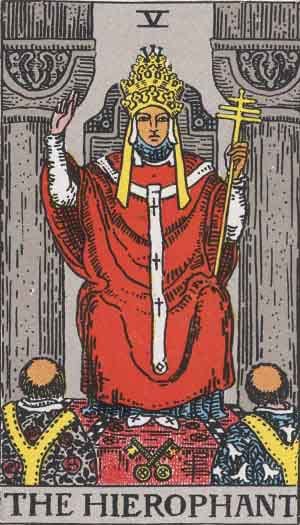
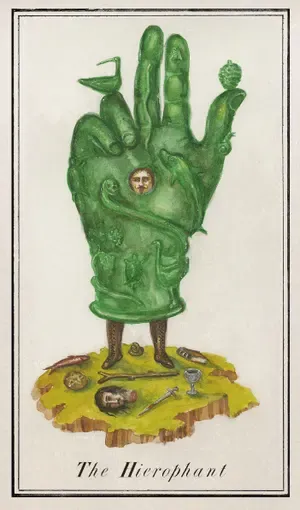
Recommendations!
Braiding Sweetgrass: Indigeneous Wisdom, Scientific Knowledge, and the Teachings of Plants by Robin Wall Kimmerer. This gorgeous book written by botanist and member of the Citizen Potawatomi Nation, Robin Wall Kimmerer, is a reminder that nature itself can be our best teacher.
Between the Worlds – a podcast hosted by Amanda Yates Garcia and produced by Carolyn Pennypacker Riggs. If you're interested in learning more about Tarot, this podcast is an amazing place to begin. Amanda is an excellent teacher and a brilliant witch, and this is where I started on my Tarot journey.
For Small Creatures Such as We: Rituals for Finding Meaning in Our Unlikely World by Sasha Sagan (daughter of THE Carl Sagan). If you find yourself craving meaning and wonder, but have an issue with organized religion, this book is a beautiful place to mull the miraculous accident of our existence, and to explore the human desire to create meaning and ritual in our lives.
Witchcraft: A History In Thirteen Trials by Marion Gibson. Gibson uses the witch trials of the past and contemporary stories of victimization and groupthink to illustrate the dangers of orthodoxy. This book illustrates the shadow side of The Hierophant – and delivers a warning about what happens when we follow leaders and teachers with blind faith.
